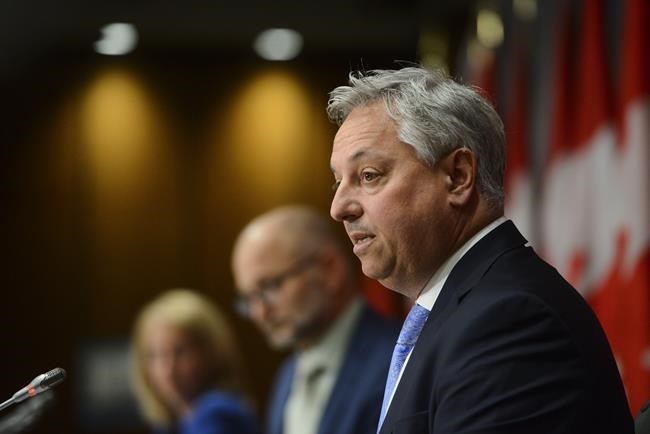OTTAWA — The head of the Canadian Security Intelligence Service warns that China is undermining Canada through its efforts to steal valuable technology and silence critics of Beijing's policies.
In a speech Tuesday sponsored by the Centre for International Governance Innovation, CSIS director David Vigneault said all sectors of Canadian society must work together to fend off these threats.
Vigneault stressed that Canadians have benefited for decades from their relationship with Chinese researchers, scholars, artists, business people and others.
"To be clear, the threat does not come from the Chinese people, but rather from the government of China that is pursuing a strategy for geopolitical advantage on all fronts — economic, technological, political and military," he said.
Vigneault bluntly stated that Beijing is using "all elements of state power to carry out activities that are a direct threat to our national security and sovereignty."
"We all must strengthen our defences."
Vigneault said ill-intentioned countries will aim to "take advantage" of Canada as it works to get back on its economic feet once the COVID-19 pandemic subsides.
Among the sectors of Canada's economy most vulnerable to state-sponsored cyberespionage are biopharmaceuticals and health, artificial intelligence, quantum computing and aerospace, he said.
These technologies are largely developed within academia in small startups, which are attractive targets because they have modest security protections and are more likely to pursue collaborations that can, and sadly are, exploited by other countries, he said.
"Investigations reveal that this threat has unfortunately caused significant harm to Canadian companies," Vigneault said.
"Collectively, it jeopardizes Canada's knowledge-based economy. When our most innovative technology and know-how is lost, it is our country's future that is being stolen."
Federal officials openly say that China has the capacity to conduct foreign interference in Canada by applying pressure and influence in a clandestine and deceptive way to pursue its strategic objectives.Â
They say China and certain other foreign nations routinely threaten and intimidate people around the world through various state entities and non-state proxies.
One notable example of this is the Chinese government's covert global program, known as Operation Fox Hunt, which claims to target corruption "but is also believed to have been used to target and quiet dissidents to the regime," Vigneault said.
"Those threatened often lack the resources to defend themselves and are unaware that they can report these activities to Canadian authorities, including CSIS."
The Chinese Embassy in Ottawa had no immediate reaction to the remarks.
Vigneault said while CSIS is most concerned about the actions of governments of countries like China and Russia, threats can originate from anywhere in the world.
The fluid and rapidly evolving environment spawned by COVID-19 has created a situation ripe for exploitation by those seeking to cause harm or advance their own interests, he said.
This has led to the continued use of online platforms by extremists to recruit others and to spread hateful messaging, anti-authority narratives and conspiracy theories about the pandemic to rationalize and justify violence.Â
"We're also seeing an increase in the exploitation of cybertools to steal sensitive information, conduct ransomware attacks and cause disruption."
The federal government recently overhauled many aspects of national-security legislation. But Vigneault indicated more must be done to update the CSIS Act, and called for a healthy public discussion of the issue.
Vigneault said the law should be changed to allow CSIS to use modern tools to access data and to share the fruits of its investigations with a broader circle of partners beyond government.
"Whether we're talking violent extremism, espionage or foreign interference, no single government department or agency can deal with these threats alone," he said.
"If we want to be effective in countering modern threats, we must build strategic partnerships within and outside government."Â
This report by The Canadian Press was first published Feb. 9, 2021.
Jim Bronskill, The Canadian Press




